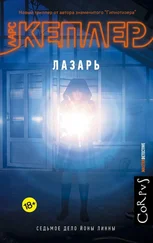‘Tell him about the serial killer?’
‘He’ll probably work out that I’m lying otherwise.’
‘Margot,’ Adam says. ‘I have to—’
‘What?’
He looks troubled as he lowers his voice.
‘This is police work,’ he says.
‘We haven’t got a choice,’ she says curtly.
‘I just think you’re going too far now,’ Adam says.
‘Am I?’
‘First you get Joona Linna mixed up in this, and now you’re going to let a hypnotist do police work.’
‘Joona Linna?’ Erik asks.
‘I’m not talking to you,’ Adam says.
‘He’s back,’ Margot says.
‘Where?’
‘Back probably isn’t the right word,’ Adam says. ‘He’s living with the Romanian Roma out in Huddinge, he’s an alcoholic, and—’
‘We don’t know that,’ she interrupts.
‘OK, Joona’s best,’ Adam says.
Margot meets Erik’s quizzical gaze.
‘Joona fainted and ended up in A&E at St Göran’s,’ she says.
‘When?’ Erik asks, getting to his feet.
‘Yesterday.’
Erik immediately picks up his phone and dials the number of a colleague in the hospital’s intensive care unit, and waits as the call goes through.
‘When can you talk to Rocky?’ Margot asks, standing up.
‘I’ll head out there first thing tomorrow,’ Erik says, as his colleague answers the phone.
After a short conversation with the doctor at St Göran’s Hospital, Erik accompanies the two detectives to the door. Katryna and Adam don’t look at each other as they walk out into the hall, and Erik gets the distinct impression that they’ve had a row.
The three of them leave the house and are swallowed up by the darkness as soon as they move beyond the circle of light in front of the door. Erik hears their footsteps on the gravel path leading to the drive, then they come into view again when the insides of their cars light up. He returns to his study and sees that the fax of the emergency records has arrived, and that — in line with correct procedure — the patient’s name and ID number have been blanked out.
Joona arrived by ambulance after a priority-1 call from the emergency command centre. Erik glances through the records of his blood pressure, heartbeat, breathing frequency, oxygenation, temperature and level of consciousness.
He was suffering from malnutrition, fever, confusion and poor circulation.
The triage nurse made the right call from the available evidence when she suspected that he was suffering from blood poisoning.
After checking his blood-gases and lactic acid, she allocated him triage level orange, the second highest level of priority.
Because of his variable vital signs, Joona Linna was placed in a room under close supervision and attached to a monitor.
While they were waiting for the results of his blood analysis they gave him broad-spectrum antibiotics and a colloid solution to help his circulation and fluid balance.
But Joona disappeared before the antibiotics could take effect.
He hadn’t given an address.
Given his symptoms, his condition was life-threatening unless he received treatment.
Erik leaves his study and picks up his jacket in the hall. He doesn’t bother to switch the lights off.
It’s no longer raining. The night air is cool and the car windows are covered with condensation. He turns the windscreen wipers on and waits for them to clear the screen before he drives off.
It’s close to midnight and the streets are almost empty. Beyond the yellow glow of the streetlamps, beyond the speed cameras and barriers and noise-reduction screens, the late summer night is as dark as heavy velvet.
He drives down Storängsleden, turns on to Centralvägen towards Dalhemsvägen, heading into an industrial area with high fences, then emerges into a patch of woodland.
There never used to be any beggars in Sweden, but over the past few years migrants from the EU have become visible in Swedish towns and cities. They’ve come here to plead for help, on their knees in the snow outside supermarkets, with outstretched hands and empty paper cups.
It’s struck Erik several times that modern Swedes have reacted with unexpected generosity to this change, considering the country’s dark history of discrimination and enforced sterilisation.
There are faint lights between the trees. He slows down and drives towards them, turning on to a gravel track, and the tiny monkey attached to his ignition key bounces up and down.
In a clearing he can see sheets flapping on a rope strung between two trees. Lengths of plywood have been nailed together, and covered with tarpaulin and plastic.
Erik turns round and parks with two wheels on the verge. He locks up and walks away from the car, staring in amongst the trees.
The air smells of potatoes and liquid gas. Four battered caravans are standing in a row, with crooked wooden shacks between them. Smoke is rising from a buckled oil-drum; glowing embers drift up, spreading a stench of burning plastic.
Joona Linna is here somewhere, Erik thinks. He’s got advanced blood poisoning and is going to die unless he gets the right antibiotics very soon. No other person on the planet has done as much for Erik as the tall detective.
A woman with a shawl over her head gives him a wary look and hurries away as he approaches.
He carries on towards the first caravan and knocks on the door. On a beautiful rug beneath the caravan stand five shabby pairs of trainers of various sizes.
‘Joona?’ Erik says loudly, and knocks again.
The caravan sways slightly and then the door is opened by an old man with eyes made cloudy by cataracts. Behind him sits a child on a mattress. On the floor a woman is asleep, fully dressed in a woolly hat and a winter coat.
‘Joona,’ Erik says in a subdued voice.
A thickset man in a padded tunic suddenly appears behind him and asks what he wants in broken Swedish.
‘I’m looking for a friend of mine, his name is Joona Linna,’ Erik says.
‘We don’t want problems,’ the man says with an anxious look.
‘OK,’ Erik says, and walks over to the second caravan and knocks on the door. It’s covered with circular scorch marks, as if people had stubbed cigarettes out on it.
A young woman in glasses cautiously opens the door. She’s wearing a thick sweater and baggy sweatpants with damp knees.
‘I’m looking for a sick friend,’ Erik says.
‘Next house,’ she whispers with a frightened look in her eyes.
A tired child has come over and pokes at Erik with a plastic crocodile.
Erik steps across two crutches lying on the ground and walks up to the third caravan. The windows are broken and covered with pieces of cardboard.
In the darkness between the trees an unshaven, tired-looking man is smoking a cigarette.
Erik knocks on the door and opens it when there’s no answer. In the glow of a clock-radio he sees his friend. Joona Linna is lying on a damp mattress with a folded blanket as a pillow. An old woman in an old-fashioned quilted jacket is sitting beside him, trying to get him to drink some water from a spoon.
‘Joona,’ he says quietly.
The floor creaks as Erik climbs inside the caravan. The water in a plastic bucket sloshes with the movement. The carpet on the floor is wet with rain by the door, and there’s a strong smell of damp and cigarette smoke. There are scraps of bluish-grey cloth covering the cardboard-patched windows. As Erik moves further inside he sees a crucifix on the wall.
Joona’s face is emaciated, covered by a grey beard, and his chest looks unnaturally sunken. His eyes look yellow, and his gaze is so unfocused that Erik isn’t sure if he’s actually conscious.
‘I’m going to give you an injection before we leave,’ Erik says, putting his bag down on the floor.
Читать дальше
Конец ознакомительного отрывка
Купить книгу
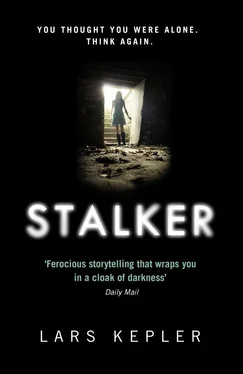
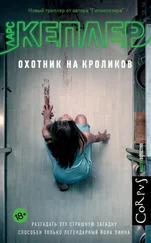
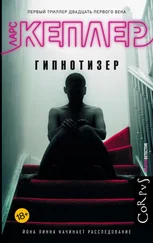
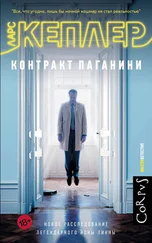
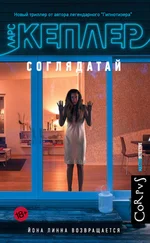
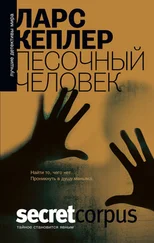
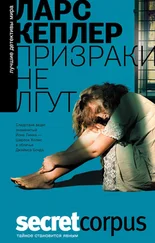

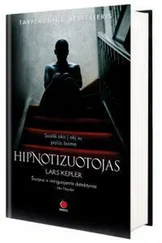
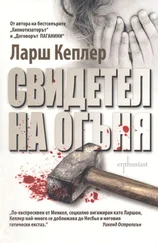
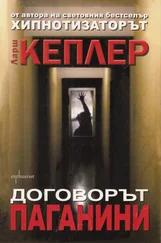
![Ларс Кеплер - Гипнотизер [litres]](/books/402890/lars-kepler-gipnotizer-litres-thumb.webp)
